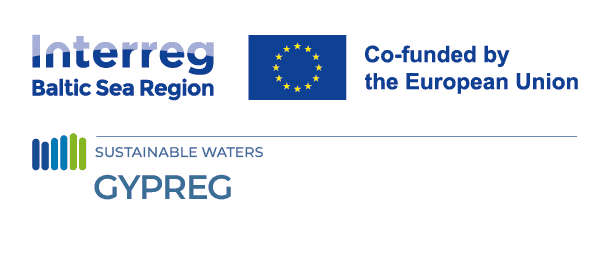
GYPREG
GYPREG
Eutrophication significantly impacts the ecological state and ecosystem services provided by the Baltic Sea. To date, there has been a limited set of measures to reduce phosphorus load from agriculture, which also affects eutrophication of the coastal waters. The project consortium invites authorities and farmers to discuss how to adapt the method to the agricultural and environmental conditions in the partnering countries, and to monitor its implementation in pilot activities.
Gypsum holds promise to cut down phosphorous leakage
Gypsum has the potential to remarkably reduce phosphorus losses from agriculture and to assist EU member states in fulfilling their obligations under the EU Water Framework Directive (WFD), Marine Strategy Directive (MSD), and Helsinki Commission (HELCOM) Baltic Sea Action Plan (BSAP), thereby aiding in the cleanup of coastal waters.
However, gypsum amendment is poorly known and lacks local applications, posing a barrier in its large-scale use. To promote the uptake of the method, the project will work closely with its target groups to enhance collaboration across the environmental and agricultural sectors, co-create and adapt the method to the agricultural and environmental conditions in the partnering countries, and implement it in pilot activities.
Creating awareness materials for diverse target groups
Ultimately, the project's findings will be synthesized into policy briefs, summary reports, and training materials, which will be shared with policymakers, authorities, farmers and providers of agricultural extension services to facilitate their adaptation by the target groups. The project will develop nationally tailored operating models for applying the gypsum method in the partnering countries in the future. Additionally, it will result in tangible reductions in phosphorus losses.
Budgets
in numbers.
-
2.74MillionTotal
-
2.19MillionErdf
-
0.00MillionNorway
Top news
News
News
Our solutions
-
Output
-
Output
-
Output
GYPREG
in numbers.
- 60.167488124.9427473
- 57.002817924.0871001
- 55.3952532142857223.855120457142856
- 52.13967624999999420.91978802931338
- 60.195603924.928423
- 59.341476818.064424
- 57.68582075000000511.978188284954435
- 56.953898324.0993642
Project partners
- TownHelsinki
- Region
- CountryFinland
- RegionHelsinki-Uusimaa
- RepresentativeFinnish Environment Institute
- Phone
- E-Mail
- Web
- TownRiga
- Region
- CountryLatvia
- RegionRīga
- RepresentativeLatvian Institute of Aquatic Ecology
- Phone
- E-Mail
- Web
- TownAkademija, Kedainiai district
- Region
- CountryLithuania
- RegionKauno apskritis
- RepresentativeLithuanian Research Centre for Agriculture and Forestry
- Phone
- E-Mail
- Web
- TownFalenty
- Region
- CountryPoland
- RegionWarszawski zachodni
- RepresentativeInstitute of Technology and Life Sciences – National Research Institute
- Phone
- E-Mail
- Web
- TownHelsinki
- Region
- CountryFinland
- RegionHelsinki-Uusimaa
- RepresentativeJohn Nurminen Foundation
- Phone
- E-Mail
- Web
- TownStockholm
- Region
- CountrySweden
- RegionStockholms län
- RepresentativeRace For The Baltic
- Phone
- E-Mail
- Web
- TownGöteborg
- Region
- CountrySweden
- RegionVästra Götalands län
- RepresentativeRISE Research Institutes of Sweden
- Phone
- E-Mail
- Web
- TownRiga
- Region
- CountryLatvia
- RegionRīga
- RepresentativeUnion Farmers Parliament
- Phone
- E-Mail
- Web
Contacts
-
Project managerEkholm PetriFinnish Environment Institute (Syke)
-
Communication managerSari VäisänenFinnish Environment Institute (Syke)
-
Financial managerSari ErkkiläFinnish Environment Institute (Syke)
Follow us
-
Social media
-
Additional links
News
Events
| 03 | - | 05 |
| June | ||
00:00 - 23:59 (CET)




